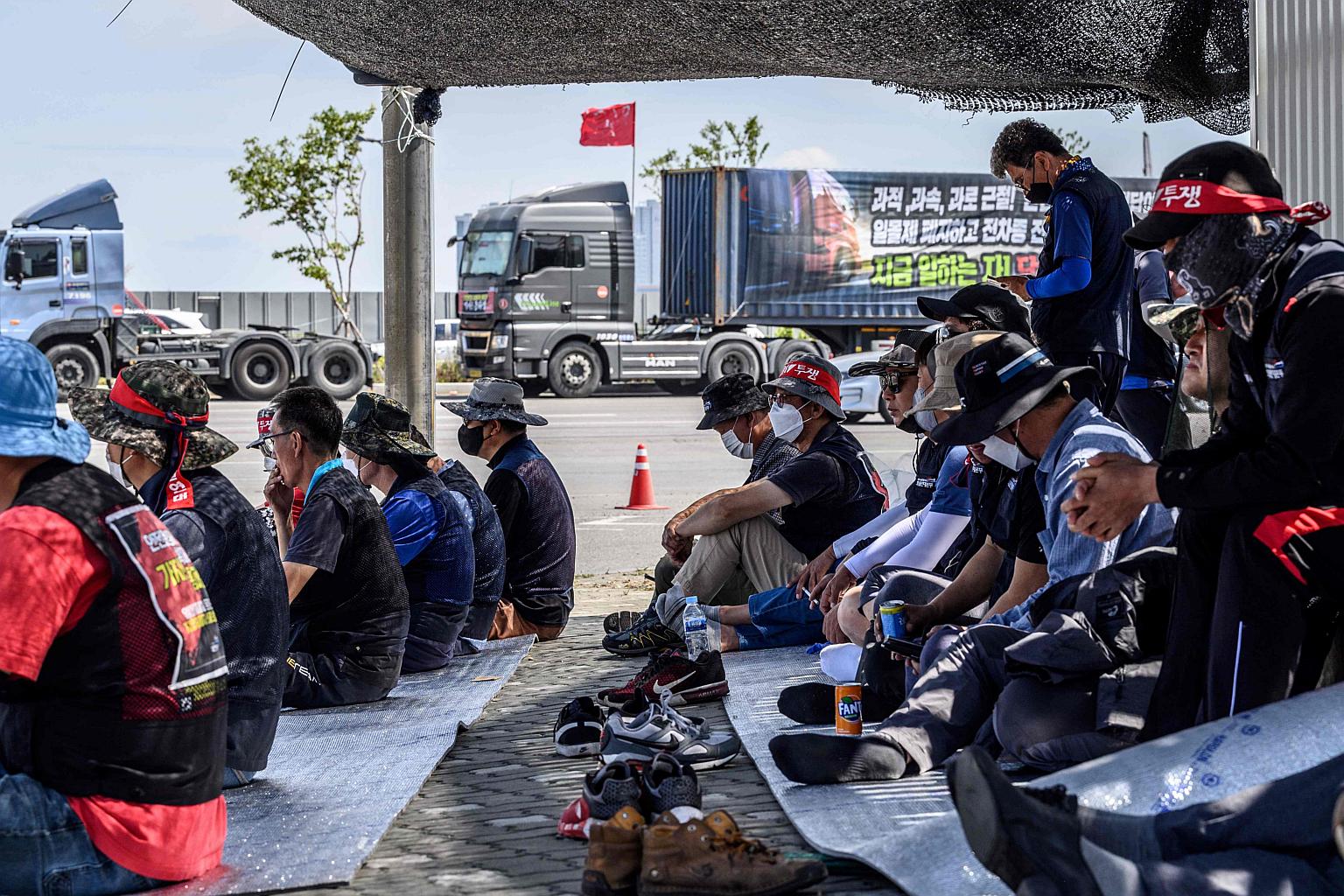South Korea truckers return to work after strike ends; shares in companies rise
Sign up now: Get insights on Asia's fast-moving developments

The truckers launched the strike last week that lasted eight days.
PHOTO: AFP
Follow topic:
SEOUL (BLOOMBERG, REUTERS) – South Korea’s unionised truckers were getting back on the road on Wednesday (June 15) after the union and the transport ministry reached a tentative late-night agreement, ending a nationwide strike that crippled ports and industrial hubs.
Shares in some affected industries rose in early trade, after the eight-day strike had delayed cargo shipments from autos to cement and alcohol, costing South Korea more than US$1.2 billion (S$1.7 billion) in lost output and unfilled deliveries.
“So the strike has been called off until our demands are passed in parliament,” said Mr Park Jung-hoon, an official at the union’s Busan chapter, referring to the process the transport ministry must undertake to implement the agreement.
“In the next two to three days, 100 per cent of unionised truckers at Busan port are expected to return to work after they get some rest. There might be some shippers who seek retributions, and in such cases, we will respond strongly.”
“So the strike has been called off until our demands are passed in parliament,” said Mr Park Jung-hoon, an official at the union’s Busan chapter, referring to the process the transport ministry must undertake to implement the agreement.
“In the next two to three days, 100 per cent of unionised truckers at Busan port are expected to return to work after they get some rest. There might be some shippers who seek retributions, and in such cases, we will respond strongly.”
Shares in Hyundai Motor rose 4 per cent while shares in Hanil Cement rose as much as 7 per cent in early trade.
The truck drivers will immediately return to work after agreeing to extend a freight rate system that guarantees minimum wages, according to a statement from the Cargo Truckers Solidarity division of the Korean Public Service and Transport Workers Union.
Under the agreement, the Transport Ministry will provide subsidies to alleviate pressure on surging fuel costs, according to the statement.
The union was demanding the extension of the freight rate system to help drivers cope with rising fuel prices.
The system was introduced in 2020 for a three-year run, aimed at preventing dangerous-driving practices, such as cargo overload, and guaranteeing minimum rates for truckers. It was due to expire this year.
The strike, which started on June 7, had roiled industries amid fears of higher costs and wider upheaval to global supply chains after Covid-19 lockdowns in China and Russia’s invasion of Ukraine.
The Ministry of Trade, Industry and Energy estimated this week that key industries saw production disruptions worth about 1.6 trillion won (S$1.7 billion).
Deliveries of cars, petrochemical products, steel and materials for semiconductor chips had been suspended or delayed, and concerns grew that a prolonged strike would force bigger production shutdowns and even put the nation’s energy security at risk.
South Korea’s top steelmaker, Posco, suspended output at its four wire-rod factories and a cold-rolled steel plant after the strike exhausted warehouse space.
Petrochemical producers also saw warehouses fill up, as they were unable to deliver raw materials used to make everything from clothing to cars.
The daily volume of container boxes transported to and from the nation’s 12 ports dropped 53 per cent on Tuesday, compared with the average for May.
Inbound and outbound volumes at Busan, the world’s seventh-busiest port, were about half their usual amount.
The crippling strike was seen as an early test for new President Yoon Suk-yeol, who vowed to deal with labour disputes “strictly”.
“We’re still on pins and needles. It’s like we’re walking on thin ice, as we face high inflation and economic crisis,” Mr Yoon said on Wednesday. “I think we should all put our community as a whole first and comply with it.”
The union was demanding the extension of the freight rate system to help drivers cope with rising fuel prices.
The transport ministry said in a separate statement it will consider expanding the freight rate system, which currently applies to shipments of containers and cement, to other items.
South Korea is the world’s largest memory chip exporter and home to global chip powerhouse Samsung Electronics, as well as large car companies, including Kia and Hyundai Motors.
But the truckers had said they were desperate due to sharp rises in fuel prices – with inflation at its highest level in over a decade.
At a Cabinet meeting earlier on Tuesday, Prime Minister Han Duck-soo called for an end to the strikes, saying they could deliver “a very difficult blow” to the country’s export-driven economy.
“It’s causing a major setback to the logistics network,” he said.
The government has come under fire for a “hostile” policy towards workers, which critics say is fuelling tensions.
On the campaign trail, Mr Yoon – a political novice – had vowed to be strict on labour disputes and indicated he was more pro-business on issues such as minimum working hours.
At least 23 members of the Cargo Truckers Solidarity Union had been arrested for “illegal activities” at the protests that include “interfering” with normal vehicle operations, according to the Transport Ministry.

